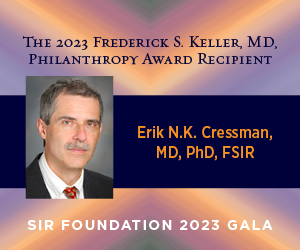SIR and SIR Foundation 2023 awardees
Awarded during the Opening Plenary Session
Sunday, March 5, 10:30 a.m.–noon
2023 SIR Annual Dr. Charles T. Dotter Lecture
The Dr. Charles T. Dotter Lecture honors one of the founding fathers of interventional radiology and selection by the SIR president is based on extraordinary contributions to the field, dedicated service to the society and distinguished career achievements in interventional radiology. The Dotter lecture is made possible with funding from SIR Foundation.

Williams S. Rilling, MD, FSIR, completed both his undergraduate studies in biochemistry and medical school at the University of Wisconsin–Madison. Following his internship at Virginia Mason hospital in Seattle, he completed radiology residency at the Medical College of Wisconsin (MCW). He proceeded to train in vascular and interventional radiology at Northwestern University in Chicago and returned to assume a faculty position in IR at MCW where he has practiced ever since.
As a junior faculty member, Dr. Rilling joined the education committee for SIR and co-directed three consecutive successful meetings on the multidisciplinary treatment of hepatocellular carcinoma. He subsequently served as education counselor on the SIR Executive Council from 2006–2008 and on the SIR Foundation Board of Directors from 2005–2008. During this time, he helped to found the Association of Program Directors in Interventional Radiology (APDIR) and the primary certificate task force, both of which would have profound implications on the future of IR training. Subsequently, he served on the SIR Annual Meeting Committee, completing this term as 2011 meeting chair.
As the subspecialty of interventional oncology was evolving, Dr. Rilling served on the Board of Directors for the World Conference of Interventional Oncology (WCIO) and on WCIO’s Annual Meeting Committee. He was WCIO meeting chair in 2014. As a founding member of the Society of Interventional Oncology, he has been on the SIO Board of Directors and SIO Executive Committee, serving as SIO president from 2019–2021.
Dr. Rilling is supported by a wonderful family. He and his wife of 31 years, Kate, have three awesome children: Nick (26), Gabrielle (23), and Nate (21). He enjoys vacationing with his family to go skiing, hiking, fishing and paddling. At MCW, he is fortunate to have a great team of partners, technologists, nurses, APPs and residents who provide the best possible patient care every day.
2023 SIR Gold Medal recipients
The Gold Medal, the Society of Interventional Radiology's highest honor, is awarded not only for extraordinary service to SIR but to those who have dedicated their past and present talents to advancing the quality of medicine and patient care through the practice of interventional radiology.

Curt and his colleagues at Montefiore Einstein in New York worked to refine the techniques of infrapopliteal angioplasty early in his clinical career. They demonstrated the efficacy of PTA for limb salvage when restoring straight-line flow to the foot. Other clinical interests included stents, lasers, lytic agents and translumbar aortography in the management of PVD, as well as mesenteric ischemia and quality improvement. He represented the SIR on the TransAtlantic Intersociety Consensus working group (TASC I) and on the AHA/ACC peripheral vascular disease writing group, two multispecialty efforts that resulted in comprehensive published guidelines for the diagnosis and treatment of peripheral arterial disease. Curt and associates also described the optimal technique for and outcomes of preoperative ethanol embolization of the renal arteries for reducing intraoperative blood loss during renal cell carcinoma resection. He has also published and lectured on the evolution of technology and its influence on the history of IR. He has been a consistent presenter at the SIR annual meeting and at local and national conferences.
Drawing on his experience in public health, Curt identified the need for a body of robust evidence-based outcomes guidelines so that interventional procedures would become more widely accepted. The Standards Division then began the process of developing such a body of work, using scientifically based consensus techniques.
Curt has served the SIR on the Executive Council, as President, and on the editorial board of the JVIR. He was the founding Director of the IR Fellowship program at Montefiore and was an examiner for the ABR.
He is gratified to have been able to teach, mentor and learn from medical students, residents, and fellows throughout his professional career. He is now Professor of Radiology Emeritus at Tufts and the past chair of radiology at Lahey Clinic. Living on Cape Cod, he also enjoys kayaking, biking, and playing in his 1960’s rock band. He remains a loyal NY Yankees fan.

James G. Caridi, MD, FSIR, was a professor of vascular and interventional radiology and chair of the department of radiology at Tulane University Medical Center. Prior to joining Tulane in 2013, Dr. Caridi served as chief of interventional radiology at the University of Florida where he studied and worked with Irvin F. Hawkins Jr., MD, FSIR, the “father of carbon dioxide angiography.” Throughout his career, Dr. Caridi continued the development and study of CO2 angiography and became a renowned expert in the field.
Dr. Caridi was a graduate of the University of Florida College of Medicine, where he did an internship in pediatrics. After his radiology residency at North Shore University Hospital, Manhasset, New York, he completed an IR fellowship at the University of Florida.
Dr. Caridi led by example, inside the IR suite and out. As a member of the SIR Foundation Gala Committee from 2012–2015 and a donor to SIR Foundation, he supported research that advanced the specialty to the benefit of our patients and encouraged other IRs to follow his lead. A recipient of the SIR Foundation Pilot Research Grant in 2002, he also ran scientific studies that furthered our understanding of IR treatments, contributing to 6 book chapters and more than 60 peer-reviewed publications. He was a dedicated mentor to many practicing IRs and the recipient of multiple teaching awards. His favorite saying and life lesson was to “Do good and forget it.”
Dr. Caridi passed away on Nov. 23, 2021, after a 10-year battle with cancer. A strong advocate for patients, he shared his experiences with members at SIR 2018 when he discussed his view as a patient on “the other side of the glass.” Dr. Caridi is survived by his wife, Rhonda, his children—Vincent Caridi, Theresa Caridi, M.D. FSIR, James Caridi, Angela Caridi, RN, and Nicco Caridi—and his 8 grandchildren.

Ziv J Haskal, MD, FSIR, is a tenured professor at the University of Virginia School of Medicine. After training in diagnostic and interventional radiology at the University of California, San Francisco, he joined the faculty of the University of Pennsylvania in 1992, before moving on to build interventional services at the New York-Presbyterian Hospital/Columbia University and then later at the University of Maryland, as professor and chief of interventional radiology.
Dr. Haskal’s research has spanned the breadth of IR, beginning with defining early research in transjugular intrahepatic portosystemic shunts (TIPS) and complex portal hypertension. His pre-clinical experimental and human studies led to creation of the TIPS endograft that is used by the majority of physicians around the world. Dr. Haskal’s studies included pre-clinical validation and in-human interventional transarterial gene vector delivery (one of the first human gene therapy trials); first demonstration of IR radiation eye injury risks at occupational levels; trials in accelerated pharmacomechanical deep vein interventions; advances in hemodialysis access care, including randomized trials of dialysis stent grafts that defined the first proven superior intervention for AV graft stenosis, benefiting thousands worldwide; liver transplant interventions; all aspects of embolization; and interventional oncology.
Dr. Haskal has published over 400 manuscripts, abstracts, chapters, books, letters and editorials in journals such as the Journal of Vascular and Interventional Radiology (JVIR), New England Journal of Medicine (NEJM), Human Gene Therapy, Circulation, Hepatology, Radiology, CardioVascular and Interventional Radiology (CVIR), and American Journal of Roentgenology (AJR). He has delivered more than 550 invited lectures worldwide, including the SIR 2021 Charles T. Dotter Lecture, and been awarded numerous honorary fellowships and national and international awards for innovation, leadership, service and research excellence.
Dr. Haskal pioneered novel education in the early 1990s with the first online monthly case discussion forum (the SIR Case Club), running complex on-site live mechanical and microscope demonstrations at medical conferences and the creation of virtual reality-based content. In 2014, he was bestowed the Leaders in Innovation Award by SIR Foundation, and in 2007, he chaired the SIR Annual Scientific Meeting. He co-founded the Global Embolization Symposium and Technologies (GEST) meeting (and coined its name).
Dr. Haskal served as the deputy editor-in-chief of CVIR for 5 years during which time he helped double its impact factor. He served for 10 years as editor-in-chief of JVIR, nearly tripling submissions and raising the journal’s impact factor to 3.037. He has mentored hundreds of trainees and helped educate newer authors through small-group writing seminars that have reached over 1,000 attendees worldwide.
Dr. Haskal has served in numerous societal leadership and committee positions, including president of the Society of Gastrointestinal Interventions and International Society of Neurovascular Disease. He was one of the longest serving members of the SIR Executive Committee, served on the SIR Foundation Board of Directors, and has chaired numerous committees within the American Heart Association, American College of Cardiology and the American College of Radiology.
2023 SIR Foundation Leaders in Innovation Award
The Leaders in Innovation Award recognizes and promotes innovation within interventional radiology, continuing IR’s historical innovative development that has revolutionized medicine over the last 40 years. The award acknowledges individuals who have conceptualized and implemented an idea that has had an advantageous impact on the practice of interventional radiology.
Born in Hungary during World War II, his family fled Hungary following the 1956 anti-communist revolution and settled in the United States. Dr. Sos graduated from Harvard Medical School in 1968. He completed a diagnostic radiology residency and a cardiovascular and interventional radiology fellowship at The New York Hospital-Cornell Medical Center, now Weill Cornell Medical Center. He spent much of his career at Weill Cornell training fellows who are now contributors to interventional radiology. He is currently a professor of radiology at Weill Medical College of Cornell University in New York.
A tireless innovator holding more than 14 patents for interventional radiology devices, his most famous devices include the first microcatheter (the “Sos Open-ended Guidewire”), the first shaped embolization coil (the “Tornado”) the “Viper” small vessel PTA catheter, and the “Omni” series of selective and flush catheters. He also developed 10 non-patented devices.
The author of more than 140 peer-reviewed papers, Dr. Sos’ “first descriptions” include coarctation angioplasty, caudo-cranial coronary angiography projections, mycocardial scintigraphy animal feasibility studies, the intra-aortic balloon pump animal feasibility studies, intermittency of massive GI bleeding, and below knee and renal artery angioplasty and stenting.
He served as SIR president from 1986–87 and received the SIR Gold Medal in 2009 honoring his contributions to SIR and the specialty. Dr. Sos has delivered a number of significant lectures including the 1988 Schering Invitation Lecture at the Royal College of Radiologists Exeter and London, the 1988 Charles Dotter Lecture at the Western Angiographic and Interventional Society, the 2002 Charles J. Tegmeyer Lecturer at the International Symposium on Endovascular Therapy (ISET), the 2007 Charles T. Dotter Memorial Lecture at the American Heart Association’s Council on Cardiovascular Radiology and Intervention, and the 2012 Charles J. Tegtmeyer Memorial Lecture at the University of Virginia. He also received the Career Achievement Award at ISET in 2015.
SIR Foundation 2023 Frederick S. Keller, MD, Philanthropy Award recipient
Awarded during the SIR Foundation Gala
Sunday, March 5, 6:30 p.m.

Erik N. K. Cressman, MD, PhD, FSIR is an associate professor of interventional radiology at University of Texas MD Anderson Cancer Center. Dr. Cressman received his PhD in organic chemistry from the University of Utah and completed his residency in diagnostic radiology at the Indiana University School of Medicine (IUSM), where he was the inaugural B. Leonard Holman Scholar. He also completed his fellowship training in IR at IUSM.
Following training, Dr. Cressman became an assistant professor at the University of Minnesota, where he served as the director of the fellowship program. He joined UT MD Anderson Cancer Center in 2013 where he currently serves as a research advisor for the University of Texas MD Anderson Cancer Center Graduate School of Biomedical Sciences PhD Advisory Committee and runs the Image Guided Chemistry Lab. He is the past director of both MD Anderson’s John S. Dunn Center for Radiologic Sciences and its Chemical Imaging Research Core.
An active volunteer with the Society of Interventional Radiology (SIR) and SIR Foundation, Dr. Cressman served on SIR Foundation’s Research Policy Committee from 2006–2014, on the SIR Policy Research and Payment (PReP) Task Force from 2016–2018, and on SIR Foundation’s Board of Directors as the Grants and Education Division Chair from 2013–2020. Dr. Cressman currently serves on SIR’s Annual Scientific Meeting Committee as the workshop chair for SIR 2023. He was elected a Fellow of the Society of Interventional Radiology in 2014.
He is a past president of the Society of Thermal Medicine and also served as the as the scientific program chair for the 2015 Society of Thermal Medicine annual meeting. He has also served as a section editor for the International Journal of Hyperthermia and as a charter member of the Image Guided Interventions and Surgery (IGIS) study section at the National Institutes of Health.
In addition to his volunteer work, Dr. Cressman is an IR researcher, focusing on tumor heterogeneity and metabolism, thermochemistry, cell stress, cancer immunology, thermal imaging, and mass spectrometry imaging. His clinical interests are in interventional oncology and the use of embolization and ablation to treat liver cancer and metastases. His goal is to improve patient care and outcomes by developing new approaches to minimally invasive, image-guided oncologic interventions based on the basic science of cancer and cell stress. Dr. Cressman has received numerous honors and awards for his contributions, primarily in new applications of chemistry in medicine. These honors include the 2007 SIR Foundation Ernest J. Ring Faculty Development Award, the 2010 SIR Foundation Gary J. Becker Young Investigator Award and the 2011 University of Minnesota Innovations Award. He also holds 14 patents.

.png)
.png)
.jpg)
.png)
.jpg)
.png)
.png)
.png)
.jpg)